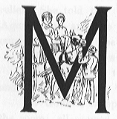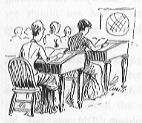
Dramatis Personæ. –Amanda (friend of Elizabeth Eliza), Amanda's mother,
girls of the graduating class, Mrs. Peterkin, Elizabeth Eliza.
AMANDA [coming in with a few graduates ].
 MOTHER, the exhibition is over, and I have brought the
whole class home to the collation.
MOTHER, the exhibition is over, and I have brought the
whole class home to the collation.
MOTHER.– The whole class! I But I only expected a few.
AMANDA.– The rest are coming. I brought Julie, and Clara, and Sophie with me. [A voice is heard. ] Here are the rest.
MOTHER.– Why, no. It is Mrs. Peterkin and Elizabeth Eliza!
AMANDA.– Too late for the exhibition. Such a shame! But in time for the collation.
MOTHER [to herself ].– If the ice-cream will go round.
AMANDA.– But what made you so late? Did you miss the train? This is Elizabeth Eliza, girls–you have heard me speak of her. What a pity you were too late!
MRS. PETERKIN.– We tried to come; we did our best.
MOTHER.– Did you miss the train? Didn't you get my postal-card?
MRS. PETERKIN.– We had nothing to do with the train.
AMANDA.– You don't mean you walked?
MRS. PETERKIN.– O no, indeed!
ELIZABETH ELIZA.– We came in a horse and carryall.
JULIA.– I always wondered how anybody could come in a horse!
AMANDA.– You are too foolish, Julia. They came in the carryall part. But didn't you start in time?
MRS. PETERKIN.– It all comes from the carryall being so hard to turn. I told Mr. Peterkin we should get into trouble with one of those carryalls that don't turn easy.
ELIZABETH ELIZA.– They turn easy enough in the stable, so you can't tell.
MRS. PETERKIN.– Yes; we started with the little boys and Solomon John on the back seat, and Elizabeth Eliza on the front. She was to drive, and I was to see to the driving. But the horse was not faced toward Boston.
MOTHER.– And you tipped over in turning round! Oh, what an accident!
AMANDA.– And the little boys–where are they? Are they killed?
ELIZABETH ELIZA.– The little boys are all safe. We left them at the Pringles', with Solomon John.
MOTHER.– But what did happen?
MRS. PETERKIN.– We started the wrong way.
MOTHER.– You lost your way, after all?
ELIZABETH ELIZA.– No; we knew the way well enough.
AMANDA.– It's as plain as a pikestaff!
MRS. PETERKIN.– No; we had the horse faced in the wrong direction,–toward Providence.
ELIZABETH ELIZA.– And mother was afraid to have me turn, and we kept on and on till we should reach a wide place.
MRS. PETERKIN.– I thought we should come to a road that would veer off to the right or left, and bring us back to the right direction.
MOTHER.– Could not you all get out and turn the thing round?
MRS. PETERKIN.– Why, no; if it had broken down we should not have been in anything, and could not have gone anywhere.
ELIZABETH ELIZA.– Yes, I have always heard it was best to stay in the carriage, whatever happens.
JULIA.– But nothing seemed to happen.
MRS. PETERKIN.– O yes; we met one man after another, and we asked the way to Boston.
ELIZABETH ELIZA.– And all they would say was, "Turn right round–you are on the road to Providence."
MRS. PETERKIN.– As if we could turn right round! That was just what we couldn't.
MOTHER.– You don't mean you kept on all the way to Providence?
ELIZABETH ELIZA.– O dear, no! We kept on and on, till we met a man with a black hand-bag–black leather I should say.
JULIA.– He must have been a book-agent.
MRS. PETERKIN.– I dare say he was; his bag seemed heavy. He set it on a stone.
MOTHER.– I dare say it was the same one that came here the other day. He wanted me to buy the "History of the Aborigines, Brought up from Earliest Times to the Present Date," in four volumes. I told him I hadn't time to read so much. He said that was no matter, few did, and it wasn't much worth it–they bought books for the look of the thing.
AMANDA.– Now, that was illiterate; he never could have graduated. I hope, Elizabeth Eliza, you had nothing to do with that man.
ELIZABETH ELIZA.– Very likely it was not the same one.
MOTHER.– Did he have a kind of pepper-and-salt suit, with one of the buttons worn?
MRS. PETERKIN.– I noticed one of the buttons was off.
AMANDA.– We're off the subject. Did you buy his book?
ELIZABETH ELIZA.– He never offered us his book.
MRS. PETERKIN.– He told us the same story,–we were going to Providence; if we wanted to go to Boston, we must turn directly round.
ELIZABETH ELIZA.– I told him I couldn't; but he took the horse's head, and the first thing I knew–
AMANDA.– He had yanked you round!
MRS. PETERKIN.– I screamed; I couldn't help it!
ELIZABETH ELIZA.– I was glad when it was over!
MOTHER.– Well, well; it shows the disadvantage of starting wrong.
MRS. PETERKIN.– Yes, we came straight enough when the horse was headed right; but we lost time.
ELIZABETH ELIZA.– I am sorry enough I lost the exhibition, and seeing you take the diploma, Amanda. I never got the diploma myself. I came near it.
MRS. PETERKIN.– Somehow, Elizabeth Eliza never succeeded. I think there was partiality about the promotions.
 ELIZABETH ELIZA.– I never was good about remembering things.
I studied well enough, but, when I came to say off my lesson,
I couldn't think what it was. Yet I could have answered some of
the other girls' questions.
ELIZABETH ELIZA.– I never was good about remembering things.
I studied well enough, but, when I came to say off my lesson,
I couldn't think what it was. Yet I could have answered some of
the other girls' questions.
JULIA.– It's odd how the other girls always have the easiest questions.
ELIZABETH ELIZA.– I never could remember poetry There was only one thing I could repeat.
AMANDA.– Oh, do let us have it now; and then we'll recite to you some of our exhibition pieces.
ELIZABETH ELIZA.– I'll try.
MRS. PETERKIN.– Yes, Elizabeth Eliza, do what you can to help entertain Amanda's friends.
[All stand looking at ELIZABETH ELIZA, who remains silent and thoughtful. ]
ELIZABETH ELIZA.– I'm trying to think what it is about. You all know it. You remember, Amanda,–the name is rather long.
AMANDA.– It can't be Nebuchadnezzar, can it?–that is one of the longest names I know.
ELIZABETH ELIZA.– O dear, no!
JULIA.– Perhaps it's Cleopatra.
ELIZABETH ELIZA.– It does begin with a "C"–only he was a boy.
AMANDA.– That's a pity, for it might be " We are seven," only that is a girl. Some of them were boys.
ELIZABETH ELIZA.– It begins about a boy–if I could only think where he was. I can't remember.
AMANDA.– Perhaps he "stood upon the burning deck?"
ELIZABETH ELIZA.– That's just it; I knew he stood somewhere.
AMANDA.– Casabianca! Now begin–go ahead.
ELIZABETH ELIZA.–
"The boy stood on the burning deck,I can't think who stood there with him
When–When–"
JULIA.– If the deck was burning, it must have been on fire. I guess the rest ran away, or jumped into boats.
AMANDA.– That's just it:–
"Whence all but him had fled."
ELIZABETH ELIZA.– I think I can say it now.
"The boy stood on the burning deck,[She hesitates. ] Then I think he went–
Whence all but him had fled–"
JULIA.– Of course, he fled after the rest.
AMANDA.– Dear, no! That's the point. He didn't.
"The flames rolled on, he would not go
Without his father's word."
ELIZABETH ELIZA.– O yes. Now I can say it.
"The boy stood on the burning deck,But it used to rhyme. I don't know what has happened to it.
Whence all but him had fled;
The flames rolled on, he would not go
Without his father's word."
MRS. PETERKIN.– Elizabeth Eliza is very particular about the rhymes.
ELIZABETH ELIZA.– It must be "without his father's head," or, perhaps, "without his father said" he should.
JULIA.– I think you must have omitted something.
AMANDA.– She has left out ever so much!
MOTHER.– Perhaps it's as well to omit some, for the ice-cream has come, and you must all come down.
AMANDA.– And here are the rest of the girls; and let us all unite in a song!
[Exeunt omnes, singing. ]
This chapter has been put on-line as part of the
BUILD-A-BOOK Initiative at the
Celebration of Women Writers.
Initial text entry and proof-reading of this chapter were the work of volunteer
Kristi Olson.